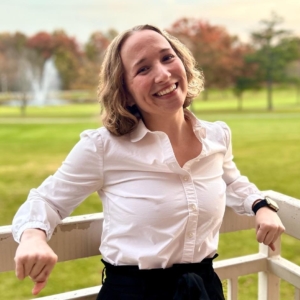
The CRA Early Career Awards are given to early-career individuals who demonstrate the potential for impactful contributions and leadership in their field of research as well as in the mission to increase participation in computing careers from populations who are underrepresented in computing research.
Nominations for the 2025 cycle are now open and will close January 31, 2025 9:00 pm ET.
*Read ‘Nomination Information’ below for important info
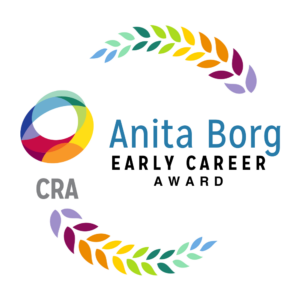
CRA Anita Borg Early Career Award
This annual award is given to an individual who is relatively early in their career in computing research (whether in academia or industry/government research labs) who best exemplifies the spirit of Anita Borg through significant contributions in research, as well as significant contributions to their profession through advancing diversity in computing research via outreach to women and other genders underrepresented in computing research.
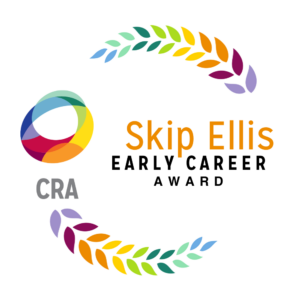
CRA Skip Ellis Early Career Award
The CRA Skip Ellis Early Career Award is in honor of Clarence “Skip” Ellis; he was the first African-American to earn a Ph.D. in computer science and the first African-American to be elected a Fellow of the ACM.
This annual award is given to an individual who is relatively early in their career in computing research whether in academia or industry/government research labs) who best exemplifies the spirit of Skip Ellis through significant contributions in research, as well as significant contributions to their profession through advancing diversity in computing research via outreach to demographics underrepresented in computing research.
Eligibility Criteria (for both awards)
The nominee must be an individual who has:
- made significant research contributions,
- had positive and significant impact on advancing diversity in the computing research community,
- is relatively early-career (at most 8 years post Ph.D. on or after January 1 of the year of award) faculty member or researcher in an industry or government lab, and
- is affiliated with an institution, industry lab, or government lab in the United States, its territories, or Canada.
CRA encourages nominations of early-career individuals who are from populations underrepresented in computing research, including Women, LGBTQIA+, Persons with Disabilities, Black, African American, Hispanic, Latino/a/x, Native American, and/or from tribal colleges and universities (TCU), historically black colleges and universities (HBCU), and other minority serving institutions (MSI).
Extenuating Circumstances
If there are extenuating circumstances for applying beyond the timeframe listed in the eligibility requirements, please make sure you address this in the application. Extenuating Circumstances beyond an applicant’s control include, but are not limited to:
- Documented medical condition or serious illness
- Death of a family member or friend
- Involuntary call to active military duty
- Maternity/family leave
In order to complete a Nomination
You will need to provide the following information through the Nomination Portal:
- Nominator Name and Contact Info
- Nominee Name and Contact Info
- Nominee’s Educational History
- Nominee’s Biographical Sketch/CV
- One (1) Nomination Letter – Completed by the Nominator
- Three (3) Supporting Letters – The supporting letters must be submitted by three individuals who support the nomination other than the nominator
- The nominator will add the supporters names and information when submitting the nomination
- You must email the supporters and request their letters of recommendation, you will then upload their letters under the corresponding supporters section.
- The criteria for these awards are research achievement and service towards the overall goals of CRA-WP
*Deadline
- The deadline to submit the nomination including the supporter letters is January 31
- If you are a nominator, please be sure to communicate this deadline to the supporters of your nomination
- The nominator will have one (1) week after January 31 to review the completed nomination and make the final submission
2024 CRA EARLY CAREER AWARD RECIPIENTS
CRA Anita Borg Early Career Award
Yakun Sophia Shao is an Assistant Professor of Electrical Engineering and Computer Sciences at the University of California, Berkeley. Previously, she was a Senior Research Scientist at NVIDIA and received her Ph.D. in 2016 from Harvard University. Her research focuses on computer architecture, specifically domain-specific architecture, deep-learning accelerators, and high-productivity hardware design methodology. Shao’s work has been awarded a Distinguished Artifact Award at ISCA’2023, the Best Paper Award at DAC’2021, the Best Paper Award at JSSC’2020, a Best Paper Award at MICRO’2019, a Research Highlight of Communications of ACM (2021), Top Picks in Computer Architecture (2023, 2014), and Honorable Mentions (2019*2). She is a recipient of a Sloan Research Fellowship, an NSF CAREER Award, the 2022 IEEE TCCA Young Computer Architect Award, an Intel Rising Star Faculty Award, a Google Research Scholar Award, and the inaugural Dr. Sudhakar Yalamanchili Award.
CRA Skip Ellis Early Career Award
Martez Mott is a Senior Researcher in the Ability group and Human Centered AI Experiences team at Microsoft Research in Redmond, Washington. He conducts research in the fields of human-computer interaction (HCI), accessibility, mixed reality, and human-centered AI. His research focuses on designing, building, and evaluating novel intelligent interactive technologies that are guided by scientific understandings of people’s experiences with computers and information. A core tenet of this work is the consultation and inclusion of potential users and beneficiaries of technologies in all aspects of the research process. He is best known for his research on improving accessibility for people with limited mobility by identifying and removing accessibility barriers found in a range of computing technologies, including touch screens, gaze-based text entry, and virtual reality hardware.Mott received his PhD and MS in Information Science from the Information School at the University of Washington (UW), where his dissertation was supported by a Microsoft Research Dissertation Grant and a UW Graduate Opportunity Minority Achievement Program Fellowship. Before attending UW, Martez received his BS and MS in Computer Science from Bowling Green State University and was awarded the Outstanding Computer Science Graduate Student Award.
Mott is passionate about improving diversity in Computer and Information Science. He was an inaugural teaching fellow and served as a research advisor at the iSchool Inclusion Institute. He co-chaired the 2020 and 2021 CHI Mentoring Workshops at the ACM CHI conference, the premier international conference for HCI research. He also cofounded and co-leads the Black Researchers @ Microsoft Research employee resource group.
Past Award Recipients
CRA Anita Borg Early Career Award2023 - Robin Brewer
 Robin BrewerRobin Brewer is an Assistant Professor in the School of Information at the University of Michigan whose research is at the intersection of human-computer interaction, accessibility, and social computing. She studies how older adults and people with disabilities engage with technology, leveraging the strengths of these communities to design for connection, expression, and agency. Robin co-directs the Accessibility, Human-Computer Interaction, and Aging (AHA) lab, is a faculty affiliate of the Center for Ethics, Society, and Computing, and is an affiliated faculty member with the Digital Studies Institute. Robin’s research has been funded by an NSF CAREER award (2022), Google (2022), the National Institutes of Health (2022), the Retirement Research Foundation (2020), and the Department of Transportation (2018). She was also awarded the prestigious President’s Postdoctoral Fellowship at the University of Michigan (2017).Throughout her career, Robin has volunteered for and co-organized mentoring programs for women and people of color, including the CHI Mentoring Program (CHIMe) at the ACM CHI conference and a virtual writing group for Black women in computing fields. She has also developed curricula and taught computational and design thinking to middle and high school girls with Brave Initiatives in Chicago, Detroit, Hamtramck, and Kingston, Jamaica. Robin received her B.S. in Computer Science from the University of Maryland, College Park, M.S. in Human-Centered Computing from the University of Maryland, Baltimore County, and Ph.D. in Technology and Social Behavior from Northwestern University.
Robin BrewerRobin Brewer is an Assistant Professor in the School of Information at the University of Michigan whose research is at the intersection of human-computer interaction, accessibility, and social computing. She studies how older adults and people with disabilities engage with technology, leveraging the strengths of these communities to design for connection, expression, and agency. Robin co-directs the Accessibility, Human-Computer Interaction, and Aging (AHA) lab, is a faculty affiliate of the Center for Ethics, Society, and Computing, and is an affiliated faculty member with the Digital Studies Institute. Robin’s research has been funded by an NSF CAREER award (2022), Google (2022), the National Institutes of Health (2022), the Retirement Research Foundation (2020), and the Department of Transportation (2018). She was also awarded the prestigious President’s Postdoctoral Fellowship at the University of Michigan (2017).Throughout her career, Robin has volunteered for and co-organized mentoring programs for women and people of color, including the CHI Mentoring Program (CHIMe) at the ACM CHI conference and a virtual writing group for Black women in computing fields. She has also developed curricula and taught computational and design thinking to middle and high school girls with Brave Initiatives in Chicago, Detroit, Hamtramck, and Kingston, Jamaica. Robin received her B.S. in Computer Science from the University of Maryland, College Park, M.S. in Human-Centered Computing from the University of Maryland, Baltimore County, and Ph.D. in Technology and Social Behavior from Northwestern University.2022 - Maya Cakmak
Maya Cakmak
Maya Cakmak is the Robert E. Dinning Career Development Associate Professor at the Paul G. Allen School of Computer Science & Engineering, University of Washington, where she directs the Human-Centered Robotics lab. She received her B.Sc. and M.Sc. degrees at the Middle East Technical University in Turkey, and her Ph.D. degree in Robotics at the Georgia Institute of Technology in 2012. Afterward, she spent a year as a post-doctoral research fellow at Willow Garage, one of the most influential robotics companies. Her research interests are in human-robot interaction, end-user programming, and assistive robotics. Her work aims to develop robots that can be programmed and controlled by a diverse group of users with unique needs and preferences to do useful tasks. Maya’s work has been published at top Robotics and AI conferences and journals, received several best paper distinctions, demonstrated live in various venues, adopted by several robotics companies, and featured in large media outlets. She is the recipient of an NSF CAREER award (2015), a Sloan Research Fellowship (2018), and Early Career Spotlight Awards at RSS (2018) and IJCAI (2019).
2021 - Finale Doshi-Velez
Finale Doshi-Velez

Finale Doshi-Velez is an Associate Professor in Computer Science at the Paulson School of Engineering and Applied Science at Harvard University. Her research is in probabilistic modeling, reinforcement learning, and interpretable machine learning with applications to healthcare. Specifically, she takes a holistic approach to the question of what kinds of treatment decision-making can be improved using observational data. This includes not only developing new methods in uncertainty quantification and batch reinforcement learning, but also in training small-but-well-performing models that can be inspected by humans for validity and methods for ensuring that the whole human+AI team together makes better decisions. Her work on formalizing interpretability has become a standard framing for work on interpretable machine learning.
Finale completed her master’s at Cambridge University as a Marshall Scholar, her Ph.D. at MIT, and her postdoc at Harvard Medical School. Her awards include two mentoring awards from Harvard (2019), a Sloan Fellow (2018), an NSF CAREER (2018), an AFOSR Young Investigator Award (2016), and being selected as one of IEEE’s AI “10 to Watch” (2013).
In addition to her research, she also co-founded the Machine Learning for Healthcare Conference, which brings together computational and clinical researchers and been heavily involved with Women in Machine Learning (including co-founding the Executive Board). At Harvard, she is the founding faculty advisor for InTouch, a graduate peer support group, and loves to spend time with her thoughtful, diverse, and fun lab.
2020 - Olga Russakovsky
Olga Russakovsky

Dr. Olga Russakovsky is an Assistant Professor of Computer Science at Princeton University where she is also affiliated with the Center for Statistics and Machine Learning and the Center for Information Technology Policy. Her research is in computer vision, closely integrated with machine learning, human-computer interaction and fairness, accountability and transparency. She focuses on three primary areas of exploration. The first is developing the fundamental building blocks of visual recognition, such as object detection, image parsing or human activity recognition. The second is designing human-machine interaction paradigms to enable computer vision systems to effectively learn from and collaborate with humans. The third is ensuring the fairness of the vision systems with respect to people of all backgrounds by improving dataset design, algorithmic methodology and model interpretability.
One of her notable research contributions is leading the ImageNet Large Scale Visual Recognition Challenge. This research appeared in the International Journal of Computer Vision in December 2015 and amassed 13,422 citations as of December 1, 2019. Her team was awarded the prestigious PAMI Everingham Prize, and the work was featured in the New York Times and MIT Technology Review. Crowdsourcing contributions of this research also appeared in the premier human-computer interaction conference (ACM CHI) in 2014 and follow-up work on remove cultural stereotypes from the dataset will appear in the ACM Conference on Fairness, Accountability and Transparency (FAT*) in 2020.
She was awarded numerous awards for her research and outreach work in addition to the PAMI Everingham Prize, such as the MIT EECS Rising Star award and NSF Graduate Research Fellowship. She was named one of MIT Technology Review’s 35 Innovators Under 35 in 2017, Foreign Policy Magazine’s 100 Leading Global Thinkers in 2015 and Becominghuman.ai’s 100 Brilliant Women in AI Ethics in 2019. She has served as a Senior Program Committee member for WACV’16, CVPR’18, CVPR’19, NeurIPS’19 and CVPR’20, has organized 9 workshops and tutorials on large-scale recognition, and has given more than 50 invited talks at universities, companies, workshops and conferences.
She completed her PhD in Computer Science at Stanford University in August 2015 and her postdoctoral fellowship at the Robotics Institute of Carnegie Mellon University in June 2017.
In addition to her research, she co-founded and serves on the Board of Directors of the AI4ALL foundation dedicated to educating diverse future Artificial Intelligence (AI) leaders. She was the co-founder and co-director of the Stanford AI4ALL summer camp for high school girls; the camp was featured in Wired and a study on its effectiveness was published in SIGCSE’16. She is the co-founder and co-director of the Princeton AI4ALL summer camp teaching AI technology and policy to underrepresented high school students. AI4ALL has partnered with 11 universities so far to introduce students from underrepresented groups to AI, and launched a free, project-based online AI education program. In addition, she is the co-founder of the annual Women in Computer Vision workshop at CVPR, the monthly Women in AI tea at Stanford, and the monthly Research Inclusion Social Event at Princeton.
This year, recognition was warranted beyond the award winners and two nominees are receiving the Distinction of Honorable Mention.

Cindy Rubio González of the University of California Davis is recognized by both the Anita Borg Early Career Award and the Skip Ellis Early Career Award committees for a joint Honorable Mention. Dr. Rubio is an Associate Professor of Computer Science at the University of California, Davis. Prior to that position, she was a Postdoctoral Researcher at the University of California, Berkeley. She received her Ph.D. in Computer Science from the University of Wisconsin–Madison in 2012. Dr. Rubio’s work spans the areas of Programming Languages, Software Engineering and High-Performance Computing, with a focus on program analysis for automated bug finding and program optimization. She is particularly interested in the reliability and performance of systems software and scientific applications. Dr. Rubio is a recipient of a DOE Early Career Award 2019, NSF CAREER award 2018, a Hellman Fellowship 2017, and a UC Davis CAMPOS Faculty Award 2014. Dr. Rubio earned her M.S. in Computer Science from the University of Wisconsin–Milwaukee and her B.S. in Computer Engineering from Saltillo Institute of Technology (Mexico). She also holds a B.M. in Piano Performance from the Autonomous University of Coahuila (Mexico).

Carole-Jean Wu of Arizona State University and Facebook AI Research is recognized by the Anita Borg Early Career Award committee. Carole-Jean Wu is a Research Scientist at Facebook AI Research. Her research focus is in the domain of computer system architecture with particular emphasis on energy- and memory-efficient systems. Her recent work has pivoted into designing systems for machine learning execution at-scale, such as for personalized recommender systems and mobile deployment. In general, she is interested in tackling system challenges to enable efficient, responsible AI execution. Carole-Jean chairs the MLPerf Recommendation Benchmark Advisory Board, co-chaired MLPerf Inference, and serves on the MLCommons Board as a director.
Carole-Jean holds tenure from ASU (Associate Professor). She received her M.A. and Ph.D. from Princeton and B.Sc. from Cornell. She is the recipient of the NSF CAREER Award, Facebook AI Infrastructure Mentorship Award, the IEEE Young Engineer of the Year Award, the Science Foundation Arizona Bisgrove Early Career Scholarship, and the Intel Ph.D. Fellowship, among a number of Best Paper awards.
CRA-WP is proud to celebrate the growing representation in computing research by highlighting both Rubio González and Wu for their significant contributions and outreach in the field. It is encouraging to see the growth in the excellent computing researchers from diverse backgrounds committed to scholarly excellence and equal opportunity.
2019 - Nadia Heninger
Nadia Heninger
Nadia Heninger is an associate professor in Computer Science and Engin
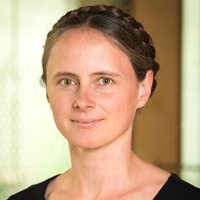 eering at the University of California, San Diego. Her research focuses on applied cryptography and security, particularly cryptanalysis of public-key cryptography in practice. She is the recipient of a 2017 NSF CAREER award. Her research has won the 2017 IRTF Applied Networking Research Prize, best paper awards at CCS 2016, CCS 2015, and Usenix Security 2012, a best student paper award at Usenix Security 2008, and Pwnie awards at Black Hat 2016, 2015, and
eering at the University of California, San Diego. Her research focuses on applied cryptography and security, particularly cryptanalysis of public-key cryptography in practice. She is the recipient of a 2017 NSF CAREER award. Her research has won the 2017 IRTF Applied Networking Research Prize, best paper awards at CCS 2016, CCS 2015, and Usenix Security 2012, a best student paper award at Usenix Security 2008, and Pwnie awards at Black Hat 2016, 2015, and2008. Her service to the community includes having served on 22 program committees, serving as program co-chair for Usenix Security 2019 and Financial Cryptography 2020, serving on the board of the International Association of Cryptologic Research, and the steering committees for NDSS and Real World Cryptography.
Before joining UC San Diego in 2019, she was an assistant professor at the University of Pennsylvania from 2013 to 2018. She received her Ph.D. in computer science in 2011 from Princeton and has been a postdoc at UC San Diego and a visiting researcher at Microsoft Research New England.
Nadia is enthusiastic about promoting diversity in computer science. She has participated in a number of outreach activities, including the GREPSEC Workshop for Women and Underrepresented Minorities in Security, the CrossFyre Workshop, the Grace Hopper Conference, the OurCS Workshop for Undergraduate Women in CS, and workshops for Girl Scouts, high school women, and undergraduate women in CS held at the University of Pennsylvania.
2018 - Yejin Choi & Reetuparna Das
Yejin Choi
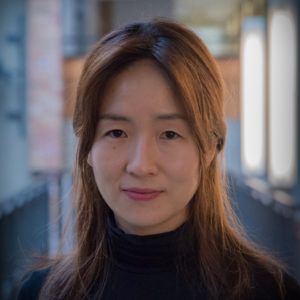
Yejin Choi is an associate professor at the Paul G. Allen School of Computer Science & Engineering at the University of Washington and also a senior research manager at AI2, leading the project Alexandria that aims to build commonsense in AI. Her research interests include language grounding with vision, physical and social commonsense knowledge, language generation with long-term coherence, conversational AI, and AI for social good. She was among the IEEE’s AI Top 10 to Watch in 2015, a co-recipient of the Marr Prize at ICCV 2013, and a faculty advisor for the Sounding Board team that won the inaugural Alexa Prize Challenge in 2017. Her work on detecting deceptive reviews, predicting literary success, and interpreting bias and connotation has been featured by numerous media outlets including NBC News for New York, NPR Radio, the New York Times, and Bloomberg Business Week. Yejin is committed to promoting diversity in computer science. Her research group represents, attracts and supports diverse members of the community. Yejin has served on the ACL executive board as a conference officer during 2015 – 2017, and worked with a special committee whose mission was to investigate the procedures and policies of the Association of Computational Linguistics (ACL) to better support equity and diversity in the ACL community.
Yejin has also served as a faculty advisor for the STARS program at the university of Washington that supports and promotes students of diverse social and economic background. In addition, Yejin has been researching computational models that can better detect the subtle but pervasive biases in language that can work against underrepresented groups. In the work presented at the Conference on Empirical Methods in Natural Language Processing (EMNLP) in 2017, her research group presented a new conceptual framework to detect connotative meanings in language with respect to agency and power and analyzed unwanted biases against women in the modern movie scripts. Among the key research directions her group continues to pursue is to build computational models and datasets that can detect and correct unwanted biases in language. Before joining the Paul G. Allen School of Computer Science & Engineering at the University of Washington in 2014, Yejin was an assistant professor at the Computer Science and Engineering Department of Stony Brook University. She received her Ph.D. in Computer Science from Cornell University.
Reetuparna Das
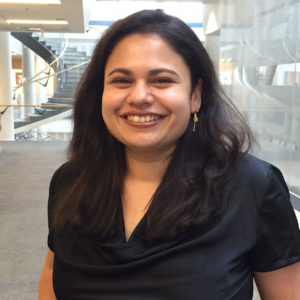
Reetu Das is an Assistant Professor at University of Michigan. Prior to this, she was a research scientist at Intel Labs, and the researcher-in-residence for the Center for Future Architectures Research. She received her PhD in Computer Science and Engineering from Pennsylvania State University, University Park. Some of her recent projects include in-memory architectures, fine-grain heterogeneous core architectures for mobile systems, and low-power scalable interconnects for kilo-core processors. Her research program has been funded by National Science Foundation, the Center for Future Architectures Research (C-FAR), Semiconductor Research Corporation and Intel Corporation. Reetu is an expert in computer architecture. She has authored over 45 papers, filed 7 patents and served on over 20 technical program committees. She has served as a track chair for Design Automation Conference for two consecutive years. Her research has been recognized by several awards. She has received outstanding research and teaching assistantship awards at Pennsylvania State University, an IEEE Top Picks award, an NSF CAREER award, and IEEE/ACM MICRO Hall of Fame award. Her recent work on in-memory design named Compute Caches received the best Demo award in C-FAR and was selected from 50 projects from leading University research groups. She also serves as the CEO of a precision medicine start-up, Sequal Inc.
Reetu is passionate about promoting diversity and mentoring women in computer science. She has participated in several outreach activities targeted towards encouraging high-school girls and freshmen women towards computing, including Girls Encoded, CS Kickstart, and Ada Lovelace opera event. She serves on the organizing committee of Women In Computer Architecture (WiCArch), an organization which brings together women researchers in computer architecture. WiCArch’s goal is to create a nurturing environment for women researchers, improve their visibility and build a strong support system.
2017 - Lydia Tapia
Lydia Tapia
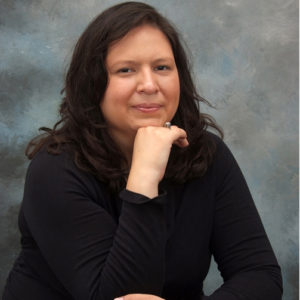 Lydia Tapia is an assistant professor in the Department of Computer Science at the University of New Mexico. Lydia received her B.S. in computer science from Tulane University and her Ph.D. in computer science from Texas A&M University. Her research contributions are in the development of computationally efficient algorithms for the simulation and analysis of high-dimensional motions for robots and molecules. Specifically, she explores problems in computational structural biology, motion under stochastic uncertainty, and reinforcement learning. Her research has been supported with more than $5 million of funding from the National Science Foundation (NSF) and National Institutes of Health (NIH). It also has led to her filing two patents: one on a novel unmanned aerial vehicle design and another on a method to design allergen treatments.
Lydia Tapia is an assistant professor in the Department of Computer Science at the University of New Mexico. Lydia received her B.S. in computer science from Tulane University and her Ph.D. in computer science from Texas A&M University. Her research contributions are in the development of computationally efficient algorithms for the simulation and analysis of high-dimensional motions for robots and molecules. Specifically, she explores problems in computational structural biology, motion under stochastic uncertainty, and reinforcement learning. Her research has been supported with more than $5 million of funding from the National Science Foundation (NSF) and National Institutes of Health (NIH). It also has led to her filing two patents: one on a novel unmanned aerial vehicle design and another on a method to design allergen treatments.Lydia is also the recipient of the 2016 Denice Denton Emerging Leader ABIE Award from the Anita Borg Institute for her high-quality research and a significant positive impact on diversity, and a 2016 NSF CAREER award for her work on simulating molecular assembly. As a Ph.D. student, she was awarded a NIH Molecular Biophysics Training Grant Fellowship, a Sloan Research Fellowship, and a P.E.O. scholarship.
She is most proud of the achievements of her students. Their accomplishments, to date, include a Popejoy Award for top Ph.D. dissertation at the University of New Mexico, being a finalist in the CRA Outstanding Undergraduate Researcher Award, and an honorable mention in the National Center for Women in Information Technology Aspirations Award for high-school students. When Lydia and her students are not toiling in the lab, you can often find them performing interactive robot demos at local schools, robotics competitions, and museums.
2016 - Martha Kim & Hanna Wallach
Martha Kim
 Martha Kim is an associate professor of computer science at Columbia University. She holds a Ph.D. in computer science and engineering from the University of Washington and a bachelor’s in computer science from Harvard University. Martha’s research interests are in computer architecture, parallel programming, compilers, and low-power computing. Her current research focuses on hardware and software techniques to improve the usability of hardware accelerators, data-centric accelerator design, and application-level power management. This work has been funded by the National Science Foundation, DARPA, the Center for Future Architectures Research (C-FAR), and Intel Corporation. Martha’s research has been recognized with several awards including a 2013 NSF CAREER award. In 2013, 2014, and 2015 her papers were featured by IEEE Micro among the “year’s most significant research papers in computer architecture based on novelty and long-term impact.” All three of these papers have included undergraduate co-authors, for which she was recognized with Columbia’s 2015 Edward and Carole Kim Faculty Involvement Award. She is the program co-chair for the 2016 IEEE International Symposium on Workload Characterization and has served on numerous program committees and review panels. Martha is committed to promoting diversity in computer science. She has been particularly active in high school outreach, participating in high-school oriented conferences such as “Code Like A Girl”, serving on a working group that reviewed and revised her own high school’s approach to STEM education, and acting as a faculty mentor for the Artemis Program summer school.
Martha Kim is an associate professor of computer science at Columbia University. She holds a Ph.D. in computer science and engineering from the University of Washington and a bachelor’s in computer science from Harvard University. Martha’s research interests are in computer architecture, parallel programming, compilers, and low-power computing. Her current research focuses on hardware and software techniques to improve the usability of hardware accelerators, data-centric accelerator design, and application-level power management. This work has been funded by the National Science Foundation, DARPA, the Center for Future Architectures Research (C-FAR), and Intel Corporation. Martha’s research has been recognized with several awards including a 2013 NSF CAREER award. In 2013, 2014, and 2015 her papers were featured by IEEE Micro among the “year’s most significant research papers in computer architecture based on novelty and long-term impact.” All three of these papers have included undergraduate co-authors, for which she was recognized with Columbia’s 2015 Edward and Carole Kim Faculty Involvement Award. She is the program co-chair for the 2016 IEEE International Symposium on Workload Characterization and has served on numerous program committees and review panels. Martha is committed to promoting diversity in computer science. She has been particularly active in high school outreach, participating in high-school oriented conferences such as “Code Like A Girl”, serving on a working group that reviewed and revised her own high school’s approach to STEM education, and acting as a faculty mentor for the Artemis Program summer school.Hanna Wallach is a senior researcher at Microsoft Research New York City and an adjunct associate professor in the College of Computer and Information Sciences at the University of Massachusetts Amherst. She is also a member of UMass’s Computational Social Science Institute. Hanna develops machine learning methods for analyzing the structure, content, and dynamics of social processes. Her work is inherently interdisciplinary: she collaborates with political scientists, sociologists, and journalists to understand how organizations work by analyzing publicly available interaction data, such as email networks, document collections, press releases, meeting transcripts, and news articles. To complement this agenda, she also studies issues of fairness, accountability, and transparency as they relate to machine learning. Hanna’s research has had broad impact in machine learning, natural language processing, and computational social science. In 2010, her work on infinite belief networks won the best paper award at the Artificial Intelligence and Statistics conference; in 2014, she was named one of Glamour magazine’s “35 Women Under 35 Who Are Changing the Tech Industry”; and in 2015, she was elected to the International Machine Learning Society’s Board of Trustees. She is the recipient of several National Science Foundation grants, an Intelligence Advanced Research Projects Activity grant, and a grant from the Office of Juvenile Justice and Delinquency Prevention. Hanna is committed to increasing diversity and has worked for over a decade to address the underrepresentation of women in computing. She co-founded two projects—the first of their kind—to increase women’s involvement in free and open source software development: Debian Women and the GNOME Women’s Summer Outreach Program. She also co-founded the annual Women in Machine Learning Workshop, which is now in its eleventh year. Hanna holds a B.A. in computer science from the University of Cambridge, an M.Sc. in cognitive science and machine learning from the University of Edinburgh, and a Ph.D. in machine learning from the University of Cambridge.
2015 - Natalie Enright Jerger
Natalie Enright Jerger

Natalie Enright Jerger is an Associate Professor in the Edward S. Rogers Sr. Department of Electrical and Computer Engineering at the University of Toronto. Prior to joining the University of Toronto in 2009, she received her MSEE and Ph.D. from the University of Wisconsin-Madison in 2004 and 2008, respectively. She received her Bachelor’s degree from Purdue University in 2002. Natalie’s research interests span a range of topics in computer architecture including interconnection networks, memory systems, many-core architectures and approximate computing. She currently leads a vibrant and enthusiastic group of 9 graduate students and 1 post-doc. She routinely invites undergraduates to do summer research in her lab. Her research has been supported by the Natural Sciences and Engineering Research Council of Canada, the Canadian Foundation for Innovation, Ontario Centres of Excellence, Intel, AMD, Qualcomm and Fujitsu.
Natalie¹s contributions to research have been recognized with several awards including the Ontario Ministry of Research and Innovation Early Researcher Award (2012), the Ontario Professional Engineers Young Engineer Medal (2014) and an Alfred P. Sloan Fellowship (2015). She served as the program co-chair of the 7th Network-on-Chip Symposium and as the program chair of the 20th International Symposium on High Performance Computer Architecture. She is currently an associate editor for IEEE Transactions on Computers, IEEE Computer Architecture Letters and ACM Transactions on Architecture and Code Optimizations. Natalie has served on numerous program committees and conference organizing committees.
Natalie is passionate about mentoring students and is deeply committed to increasing the participation of women in computer science and engineering. She is actively involved in outreach and mentorship both locally and in the computer architecture community. She regularly speaks with high school students to promote interest in engineering. She co-organizes wicarch, an informal networking group of women in computer architecture designed to provide mentoring to female graduate students pursuing research in the field. In 2012, she co-organized a CRA-W/CDC Discipline Specific Mentoring Workshop on Computer Architecture. She has also spoken at several mentoring workshops including CRA-W Grad Cohort.
2014 - Jaime Teevan
Jaime Teevan is a Senior Researcher at Microsoft Research, and an Affiliate Assistant Professor in the Information School at the University of Washington. Working at the intersection of human computer interaction, information retrieval, and social media, she studies and supports people’s information seeking activities. Jaime was named a Technology Review (TR35) 2009 Young Innovator for her research on personalized search. She is particularly interested in understanding social and temporal context. She co-authored the first book on collaborative Web search and was chair of the Web Search and Data Mining (WSDM) 2012 conference.
Jaime also edited a book on Personal Information Management (PIM), edited a special issue of Communications of the ACM on the topic, and organized workshops on PIM and query log analysis. She has published numerous technical papers, including several best papers, and received a Ph.D. and S.M. from MIT and a B.S. in Computer Science from Yale University.
Jaime is passionate about mentoring young researchers and encouraging women to pursue computer science careers. She works with a number of graduate students, a high percentage of whom are female, talks regularly on topics related to gender and family, and publishes a popular web series on academic writing. As a mother to four young children, Jaime is particularly interested in helping researchers integrate parenthood with their academic pursuits. For example, she has written several articles about conference travel with children, and worked with conference organizational committees to implement better support for attendees with families.
2013 - Yanlei Diao
Yanlei Diao is an Associate Professor at the School of Computer Science, University of Massachusetts Amherst. Her research interests lie in intelligent, real-time data management and big data analytics. She received her PhD in Computer Science from the University of California, Berkeley in 2005, and joined UMass Amherst in the same year. Yanlei has worked on a broad set of topics, including low-latency big data analytics, data streams, uncertain data management, and XML query processing. She has produced substantial results in these areas, resulting in 41 refereed publications including 17 papers at the most prestigious database conferences and journals. She has also released software with over 1000 downloads. Her technical contributions have had a significant impact in industry, resulting in research awards from Cisco, Google, IBM, NEC labs, etc., and led to collaborations with leading medical institutes. Yanlei is currently an Associate Editor of PVLDB, and has served on the program committees of all major database conferences as well as the organizing committees of ACM SIGMOD, CIDR, and DMSN.
Yanlei’s research contributions have been recognized in a series of awards, including the NSF Career Award, the IBM Scalable Innovation Faculty Award, and as one of eleven finalists for the Microsoft Research New Faculty Fellowship. She was a Distinguished Faculty Lecturer at the University of Texas at Austin, and has given more than 35 invited talks. In addition, her PhD dissertation won the 2006 ACM-SIGMOD Dissertation Award Honorable Mention.
Yanlei is fully committed to broadening the participation of women in computer science. She is playing a leadership role in outreach in both her school and in her research community. At UMass, she is co-chairing the outreach committee of her school, with a goal to attract more high school girls and women to computing. In her research community, she twice chaired the New Research Symposium at SIGMOD, which provides career advice and mentoring to graduate students and junior researchers, including many women. Yanlei is also a frequent speaker at mentoring workshops, including the CRA-W Graduate Cohort workshop and the SIGMOD DBMe mentoring workshop. She has advised 11 graduate and 8 undergraduate student researchers, 7 of which are women, and served as academic advisor of 10-20 undergraduates each semester.
2012 - M. Bernardine Dias & Katie A. Siek
M. Bernardine Dias is an Associate Research Professor at Carnegie Mellon University. She has worked with both the Pittsburgh and Doha campuses and her primary affiliation is with the Field Robotics Center at the Robotics Institute. Originally from Sri Lanka, Dr. Dias earned her B.A. from Hamilton College in Clinton, New York with a dual concentration in Physics and Computer Science and a minor in Women’s Studies (1998), followed by a M.S. (2000) and Ph.D. (2004) in Robotics from Carnegie Mellon University. Her research interests span technology for underserved communities and autonomous human-robot team coordination.
Dr. Dias’ principal research objective is to create culturally appropriate computing technology accessible to underserved communities. To this end she founded and directs the TechBridgeWorld research group that innovates and field tests computing solutions that address the needs of underserved communities around the world. Over the last eight years she has traveled to many parts of the world, meeting with underserved communities, creating technology solutions to fit their needs, empowering future technologists in these communities, and inspiring many students to follow her lead. TechBridgeWorld’s innovations span a variety of tools ranging from a low-cost automated Braille Writing Tutor for blind children, to computing and mobile phone-based tools for enhancing English literacy education, and many more. Dias is also a recognized leader in autonomous team coordination research. Her doctoral dissertation developed the “TraderBots” market-based framework for multi-robot coordination in dynamic environments. She continues to advance the state-of-the-art in autonomous team coordination and planning through the rCommerce research group which she co-created and co-directs. Her research efforts also extend to Carnegie Mellon’s Qatar campus through the Qri8 robotics lab which she co-founded and co-directs.
Dr. Dias has authored many articles for leading academic journals and conferences, given numerous presentations at a variety of forums, and has received several honors and awards. She has also lead several research projects as principal investigator with funding from a variety of sponsors including the Qatar National Research Fund, the Boeing Company, Yahoo, and Google.
Dias is also passionate about mentoring students and works through many avenues to encourage young people, and especially girls and women, to pursue careers in technology. Encouraging women in computing is one of Dr. Dias’ passions. At Carnegie Mellon University, she is a founding member of Women@SCS, a campus organization dedicated to creating and supporting women’s professional and social opportunities in computing. She currently serves as faculty advisor to the graduate Women@SCS.
Katie Siek is an assistant professor in Computer Science at the University of Colorado Boulder. Her primary research interests are in human computer interaction, health informatics, and ubiquitous computing. More specifically, her research examines how technology can enable people to proactively manage their own health. Professor Siek’s research has been disseminated in 27 peer-reviewed publications and 23 invited research talks. The best part of her job is collaborating with brilliant students – 5 Ph.D. students (2 women), 13 M.S. students (3 women), 10 B.S. students (9 women, 2 first-generation college students), and 1 female high school student.
Dr. Siek is on the ACM-W Council and is currently a co-editor for the ACM-W Newsletter. She collaboratively developed a workshop series to train students and staff members from other universities about starting K-12 outreach programs. In addition, she is on the college’s Diversity Action Committee and advises underrepresented and first-generation college students.
Dr. Siek’s research is supported by the National Institutes of Health, the Robert Wood Johnson Foundation, and a National Science Foundation CAREER award. She earned her PhD and MS in computer science from Indiana University Bloomington and her BS in computer science from Eckerd College. She was a National Physical Science Consortium Fellow at Indiana University.
2011 - Alexandra Fedorova
Alexandra (Sasha) Fedorova is an Assistant Professor of Computer Science at Simon Fraser University. She earned her Ph.D. at Harvard University in 2006 under Margo Seltzer. Sasha’s mostly known for her research on operating system scheduling for multicore processors — research which she started at Sun Microsystems Labs during her three-year internship. While at Sun Labs, she also co-developed the simulator for Sun’s Niagara processor and participated in research on Hybrid Transactional Memory. At SFU Sasha has co-founded the Systems, Networking and Architecture (SYNAR) research lab. Her present focus is on improving efficiency of multicore processors using software methods, be it OS algorithms, hypervisor policies or the language runtime. Sasha has more than 40 refereed publications, and gave more than 20 invited talks and appearances. She widely collaborates with industry, and her research is supported by (formerly) Sun Microsystems and now Oracle, Google, Research in Motion, ST Microelectronics, Intel, and Electronics Arts. Sasha enjoys working with her team of 11 graduate students and participating in outreach activities women and minorities. She was a speaker at 4 career and technical workshops for women and minorities, a mentor in the Canadian Distributed Mentor Project and a participant in two ScienceAlive camps that introduced middle-school kids to technology.
2010 - AJ Bernheim Brush & Radhika Nagpal
Dr. A.J. Bernheim Brush is a Senior Researcher at Microsoft Research. Dr. Brush’s research area is Human-Computer Interaction with a focus on Ubiquitous Computing and Computer Supported Collaboration (CSCW). Dr. Brush is most well known for her research on technologies for families and her expertise conducting field studies of technology. Her current focus is home automation as co-leader of the Lab of Things project. She is a Senior Member of the ACM and was honored to receive a Borg Early Career Award in 2010. Her research has received 2 best paper awards and several best paper nominations. She has 11 patents and more than 18 inventions patent pending. Dr. Brush was co-general chair of UbiComp 2014, and serves on the UbiComp Steering Committee and is co-chair of CRA-W. Dr. Brush also serves regularly on Program Committees for many conferences including UbiComp, Pervasive, CHI, and CSCW. Dr. Brush graduated Summa cum Laude from Williams College and earned her Ph.D. in Computer Science at the University of Washington.
Radhika Nagpal is an Associate Professor of Computer Science at Harvard University and a member of the Wyss Institute for Biologically Inspired Engineering. She received her PhD degree in Computer Science from MIT, and spent a year as a research fellow at Harvard Medical School. Currently, Radhika is a professor in Computer Science, in the Harvard School of Engineering and Applied Sciences. She is also a core faculty member of the Harvard Wyss Institute for Biologically Inspired Engineering, where she co-leads the BioRobotics Platform. She is a recipient of the 2005 Microsoft New Faculty Fellowship award and the 2007 NSF Career award. Her research interests are in bio-inspired multi-agent systems, their application to robotics and networks, and understanding multi-cellular systems in biology.
2009 - Kim Hazelwood
Kim Hazelwood is a Director of Systems Research at Yahoo! Labs. Kim’s general research interests include computer architecture, performance analysis and tools, power-aware computing, memory-constrained devices, accelerators, and code optimization. Previously, she was a software engineer in the Platforms division of Google, where she focused on performance analysis of large datacenter apps and road-mapping of Google data centers. Prior to that, Kim was a tenured Associate Professor of Computer Science at the University of Virginia and a faculty consultant for Intel. While at UVA, she was also a one-day-per-week faculty consultant for Intel, where she helped co-develop the Pin dynamic instrumentation system, which has been downloaded over 60,000 times and cited in over 1000 publications. She has a PhD in Computer Science from Harvard University and has authored 40 publications and one book. Kim is a recipient of the MIT Top 35 Innovators under 35 award, the Anita Borg Early Career Award, and an NSF Career Award.
2008 - Chandra Krintz
Chandra Krintz has been an Associate Professor of Computer Science at the University of California, Santa Barbara (UCSB) since 2007. She joined the UCSB faculty in 2001 as an Assistant Professor after receiving her M.S. and Ph.D. degrees in Computer Science from the University of California, San Diego. Chandra’s research area is programming language implementations, and her work focuses on automatic and adaptive compiler, virtual runtime, and operating system techniques that improve performance (for high-end systems) and increase battery life (for mobile, resource-constrained devices). Chandra’s research has been published in a number of ACM venues including ASPLOS, CGO, ECOOP, LCTES, OOPSLA, PACT, PLDI, TACO, TPDS, has been funded by grants from the National Science Foundation (NSF), Intel, and Microsoft, and has been recognized with an NSF CAREER award (in 2006). Chandra has also been recognized for teaching excellence with the senior-selected, 2008 co-award for outstanding Faculty Member in Computer Science. Moreover, Chandra has contributed significantly to the outreach, support, and encouragement of women in the field. In particular, Chandra has been instrumental in her department’s diversity-aware curriculum efforts, plays an active role as (elected) vice-chair of the Executive Committee of the ACM Special Interest Group on Programming Languages (SIGPLAN) to oversee the organization of the SIGPLAN conferences and to improve diversity and participation of women in the community, and has implemented multiple, novel, curricular directions that facilitate retention of female computer science undergraduates and that expose young girls to the opportunities and potential of computer science. Specifically, Chandra has implemented courses in which computer science and engineering students use their computer skills (of different levels) to help others in the community (e.g., non-profit organizations) with technology and to introduce other young people to the potential of computer science (e.g., local high school students). Since 2007, Chandra has partnered with Microsoft Research (MSR) and Girls Incorporated, a nationwide non-profit organization dedicated to inspiring young girls to be strong, smart, and bold. Chandra and her students teach Girls Inc. classes (for girls of ages 9-10) that introduce the girls to and engage them with the field of computer science, and that show them how fun computer programming can be — with the help of a computer game from MSR and only a game controller.
2007 - Li-Shiuan Peh
Li-Shiuan Peh is Professor of Electrical Engineering and Computer Science at MIT, and has been on the faculty of MIT since 2009. Previously, she was on the faculty of Princeton University from 2002. She graduated with a Ph.D. in Computer Science from Stanford University in 2001, and a B.S. in Computer Science from the National University of Singapore in 1995. Her research focuses on low-power interconnection networks, on-chip networks and parallel computer architectures, and is funded by several grants from the National Science Foundation, the DARPA MARCO Gigascale Systems Research Center as well as Intel Corporation. She was awarded the Sloan Research Fellowship in 2006, and the NSF CAREER award in 2003. She has been involved in the organization and participation of several outreach activities as the faculty co-adviser of the Princeton Graduate Women in Science and Engineering (GWISE) since 2003, organizing activities both within and beyond Princeton such as an annual event for 100+ high school girls in New York City targeted at attracting women into Engineering since 2004, and a career workshop at Princeton for women undergraduates and graduates from universities in the tri-state area in 2006. She has also organized and participated at a NSF-funded CRA-W/CDC Computer Architecture Summer Workshop for minorities in computer architecture, and spoke at a distinguished women faculty lecture series at UT Austin.
2006 - Gail Murphy
Gail Murphy is a Professor in the Department of Computer Science and Associate Dean (Research & Graduate Studies) in the Faculty of Science at the University of British Columbia. I am also a co-founder and Chief Scientist at Tasktop Technologies Incorporated. My research interests are in software engineering with a particular interest in improving the productivity of knowledge workers, including software developers. My group develops tools to aid with the evolution of large software systems and performs empirical studies to better understand how developers work and how software is developed. My teaching spans from introductory computer science courses to undergraduate and graduate courses in software engineering. She received a B.Sc. (Honours) degree in Computing Science from the University of Alberta in 1987, and the M.S. and Ph.D. degrees in Computer Science from the University of Washington in 1994 and 1996, respectively. Between her undergraduate degree and attending graduate school, she worked as a senior software engineer at MPR Teltech, a telecommunications research and development company that was located in Burnaby B.C.Dr. Murphy has served on numerous program committees for the leading conferences in software engineering research, she was the general chair for the 2004 Aspect-oriented Software Development Conference, and she served two years as the Associate Head for Graduate Affairs in the Department of Computer Science. In 2005, she received the Dahl-Nygaard Junior Prize from AITO and in 2006, she was awarded a NSERC Steacie Fellowship.
2005 - Yuanyuan Zhou
Yuanyuan (YY) Zhou is a Qualcomm Chair Professor at University of California, San Diego, where she joined since 2009. Prior to UCSD, she was a tenured associate professor at University of Illinois, Urbana-Champaign. From 2000-2002, she co-founded a storage startup called Emphora in Princeton, NJ. In 2007, She co-founded her second startup, Pattern Insight . Pattern Insight has deployed solutions used by many large companies. Dr. Zhou has made significant contributions in the interdisciplinary area of architecture and operating system. She is one of the first to create an architecture and operating system support for software debugging and to apply data mining to program analysis for bug detection. Her work has received wide attention inside and outside the architecture and operating system research community. Her recent projects include the ARTS project, which is one of the first investigating architecture and operating system support to improve software quality including robustness, reliability and availability. Her PSALM project is one of the pioneering projects in the direction of power management for data centers. She has received an NSF Career award, an IBM Faculty Award, and an IBM SUR award. Dr. Zhou also had 2 papers selected by IEEE Micro’s Top Picks from architecture conferences in 2004. In addition to her research contributions, Dr. Zhou actively reach out to women in computer science at all levels. At UIUC, she helped organize the first annual Undergraduate Women in Engineering camp in 2003 for first year students. In 2004, she participated in the CRA-W’s DREU project and hosted 2 women undergraduate students in summer projects. Additionally, she joined with several other women faculty members at UIUC to push the department to set up child-care grants for women with small children to travel to conferences.
2004 - Joanna McGrenere
Currently Dr. Joanna McGrenere is a Computer Science professor and Associate Head of Graduate Affairs at UBC. Joanna’s general philosophy of HCI teaching is that students learn best while doing hands-on team work, both large term projects and short activities. This philosophy is evident both in my graduate and undergraduate teaching. For example, she developed a new Advanced Methods in HCI undergrad course (CS 444) around a team-based learning model. In parallel, she set up the new HCI Learning Studio which follows a radically different model than traditional CS undergraduate labs in its emphasis on and facilitated support of team-based learning processes, and in supporting the creation of design artifacts and the HCI design process more generally. For her efforts she was awarded two Computer Science Incredible Instructor Awards: in 2004 for CS 544 and in 2011 for CS 444. Dr. McGrenere has made outstanding contributions to the field of Human Computer Interaction (HCI). Particularly relevant to this award is her leadership on the Aphasia Project – a large, multi-disciplinary effort spanning several academic fields, institutions and organizations in participatory technology research and design.
Past Award Recipients
CRA Skip Ellis Early Career Award2023 - Michael Carbin
Michael Carbin is an Associate Professor of EECS at MIT and Founding Advisor at MosaicML. At MIT, he leads the Programming Systems Group. Typical goals for his work include improved reliability, performance, energy consumption, and resilience for computer systems using techniques from Programming Languages.
Michael has received an NSF CAREER Award, a Sloan Foundation Research Fellowship, and a MIT Frank E. Perkins Award for Excellence in Graduate Advising. His work has received best paper awards at OOPSLA, ICLR, and ICFP. His work has also received a CACM Research Highlight.
Michael received a B.S. in Computer Science from Stanford University in 2006, and an S.M. and Ph.D. in Electrical Engineering and Computer Science from the Massachusetts Institute of Technology in 2009 and 2015, respectively. Michael was also a Researcher at Microsoft Research, working on Deep Learning Systems from 2014 to 2018.
2022 - Christina Harrington
Christina Harrington

Christina Harrington is an Assistant Professor at Carnegie Mellon University in the HCI Institute in the School of Computer Science with a courtesy appointment in the School of Design. Her research addresses health and racial equity through human-computer interaction and design research approaches where she explores and co-design technologies to support the needs of historically marginalized groups. Christina has worked for over a decade to implement technological interventions for Black and Brown individuals and those with disabilities and impairments in areas of community health advocacy, health information seeking, and community design of technology futures. Christina has published work at premier HCI venues and won best paper and honorable mention awards for her work on equitable participatory design with Black elders and Black youth. She has presented her work at academic institutions, government agencies, and industry seminars. Christina holds a Ph.D. in Design from Georgia Tech, a Masters of Industrial Design from NC State University, and a B.S. in Electrical Engineering from Virginia Tech.
As a researcher, Christina combines her background in electrical engineering and industrial design to focus on areas of universal, accessible, and inclusive design. Specifically, she looks at how to use design in the development of products to support historically excluded groups such as Black communities, older adults, and individuals with differing abilities in maintaining their health, wellness, and autonomy in defining their future. Christina is passionate about using design to center communities that have historically been at the margins of mainstream design. She looks to methods such as design justice and community collectivism to broaden and amplify participation in design by addressing the barriers that corporate approaches to design have placed on our ability to see design as a universal language of communication and knowledge. Throughout her career, Christina has demonstrated her commitment to supporting underrepresented communities including mentoring first-generation college and graduate students, teaching and supporting outreach programs for young girls of color in computer science and design, and supporting community organizations focused on the betterment and liberation of Black residents in resource-constrained communities. She is currently the director of the Equity and Health Innovations Design Research Lab which stands to support community-based participatory research in Black and Brown communities and amplifies the work of those advocating for eliminating social inequities.
2021 - Sanmi Koyejo
Sanmi Koyejo

Sanmi (Oluwasanmi) Koyejo is an Assistant Professor in the Department of Computer Science at the University of Illinois at Urbana-Champaign. Koyejo’s research interests are in developing the principles and practice of trustworthy machine learning. Additionally, Koyejo focuses on applications to neuroscience and healthcare. Koyejo completed his Ph.D. in Electrical Engineering at the University of Texas at Austin, advised by Joydeep Ghosh, and completed postdoctoral research at Stanford University. His postdoctoral research was primarily with Russell A. Poldrack and Pradeep Ravikumar. Koyejo has been the recipient of several awards, including a best paper award from the conference on uncertainty in artificial intelligence (UAI), a Sloan Fellowship, a Kavli Fellowship, an IJCAI early career spotlight, and a trainee award from the Organization for Human Brain Mapping (OHBM). Koyejo serves on the board of the Black in AI organization.

This year, recognition was warranted beyond the award winner and one additional nominee is receiving the Distinction of Honorable Mention. Shiri Azenkot of Cornell University is recognized by the Skip Ellis Early Career Award committee. Shiri Azenkot is an Associate Professor of Information Science at the Jacobs Technion-Cornell Institute at Cornell Tech, Cornell University, where she directs the Enhancing Ability Lab. She is also an affiliate faculty member in the Computer Science Department at the Technion–Israel Institute of Technology. Her research interests are in accessibility and interaction on new platforms. In 2019, she co-founded XR Access, a community dedicated to making augmented and virtual reality accessible to people with disabilities. Shiri frequently publishes at top HCI and accessibility conferences, including CHI, ASSETS, UIST, and UbiComp. She is the recipient of the NSF CAREER and CRII awards, and multiple best paper awards and nominations. Currently, her research is funded by the NSF, AOL, Verizon, and Facebook. Before arriving at Cornell Tech, she was a Ph.D. student in Computer Science & Engineering at the University of Washington, where she was advised by Richard Ladner and Jacob Wobbrock.
2020 - Tawanna Dillahunt & Michel A. Kinsy
Tawanna Dillahunt

Tawanna Dillahunt is an Associate Professor at the University of Michigan’s School of Information (UMSI) and holds a courtesy appointment with the Electrical Engineering and Computer Science Department. Working at the intersection of human-computer interaction; environmental, economic, and social sustainability; and equity, her research investigates and implements technologies to support the needs of marginalized people. She and her team have developed digital employment tools that address the needs of job seekers with limited digital literacy and education; assessed real-time ridesharing and online grocery delivery applications among lower-income and transportation-scarce groups, and proposed models for novice entrepreneurs to build their technical capacity.
Tawanna has received funding to support her research from the National Science Foundation, the Gates Foundation, UM Poverty Solutions, UM Ginsberg Center, and the UM Ford School. Her work appears in the most prestigious HCI conferences and journals and has won several best papers and honorable mentions. She holds a Ph.D. and M.S. in Human-Computer Interaction from Carnegie Mellon University, an M.S. in Computer Science from the Oregon Health and Science University, and a B.S. in Computer Engineering from North Carolina State University. She was also a software engineer at Intel Corporation for seven years.
Tawanna has demonstrated commitment to supporting underrepresented people and communities. She is a Digital Inclusion Policy fellow mentor for UM Poverty Solutions and is a member of the Advisory Committee for the University of Michigan Center for Academic Innovation. The nature of her research alone enables her to work with a diverse set of passionate students and community members who have been attracted to her research. She directs the Social Innovations Group and has mentored numerous, master’s, undergraduate, and high school students, and postdocs, over half who are women and underrepresented minorities. She actively participates in programs that benefit underrepresented groups and engages in community-based participatory research.
Michel A. Kinsy

Michel A. Kinsy is an Assistant Professor in the Department of Electrical and Computer Engineering at Boston University (BU), where he directs the Adaptive and Secure Computing Systems (ASCS) Laboratory. He focuses his research on computer architecture, hardware-level security, and efficient hardware design and implementation of post-quantum cryptography systems. He has published over 60 research articles, many in top-tier conferences and journals, including the International Symposium on Computer Architecture, International Symposium on High-Performance Computer Architecture, IEEE International Symposium on Hardware Oriented Security and Trust, IEEE Transactions on Computer-Aided Design of Integrated Circuits and Systems, and IEEE Transactions on Computers.
Michel is an MIT Presidential Fellow. He earned his Ph.D. in Electrical Engineering and Computer Science in 2013 from the Massachusetts Institute of Technology (MIT). In his doctoral work, he introduced some of the first algorithms and innovative hardware techniques to emulate and control large-scale power systems at the microsecond resolution. The work inspired further research by the MIT spin-off Typhoon HIL, Inc. Before joining the BU faculty, Michel was an assistant professor in the Department of Computer and Information Systems at the University of Oregon, where he directed the Computer Architecture and Embedded Systems (CAES) Laboratory. From 2013 to 2014, he was a Member of the Technical Staff at the MIT Lincoln Laboratory, where he led the Advanced Computer Architecture Concepts sub-group tasked with exploring future secure computing architectures in critical DoD systems.
Michel is a mentor who inculcates a culture of embracing diversity, intellectual honesty, excellence in research, social responsibility, and personal integrity among the mentees in his research laboratory – three of them are underrepresented doctoral students. His outreach efforts include creating the University of the Virgin Islands Summer Cybersecurity Program; organizing ACM Richard Tapia Celebration of Diversity in Computing Conference workshops on open-source computer architecture design space exploration and post-quantum cryptosystem design; introducing a computer science module into the Oregon Young Scholars Program for preparing historically underserved students for college, and the University of Oregon African-American Rites of Passage Program.
This year, recognition was warranted beyond the award winners and an additional nominee is receiving the Distinction of Honorable Mention.

Cindy Rubio González of the University of California Davis is recognized by both the Anita Borg Early Career Award and the Skip Ellis Early Career Award committees for a joint Honorable Mention. Dr. Rubio is an Associate Professor of Computer Science at the University of California, Davis. Prior to that position, she was a Postdoctoral Researcher at the University of California, Berkeley. She received her Ph.D. in Computer Science from the University of Wisconsin–Madison in 2012. Dr. Rubio’s work spans the areas of Programming Languages, Software Engineering and High-Performance Computing, with a focus on program analysis for automated bug finding and program optimization. She is particularly interested in the reliability and performance of systems software and scientific applications. Dr. Rubio is a recipient of a DOE Early Career Award 2019, NSF CAREER award 2018, a Hellman Fellowship 2017, and a UC Davis CAMPOS Faculty Award 2014. Dr. Rubio earned her M.S. in Computer Science from the University of Wisconsin–Milwaukee and her B.S. in Computer Engineering from Saltillo Institute of Technology (Mexico). She also holds a B.M. in Piano Performance from the Autonomous University of Coahuila (Mexico).
CRA-WP is proud to celebrate the growing representation in computing research by highlighting both Rubio González for her significant contributions and outreach in the field. It is encouraging to see the growth in the excellent computing researchers from diverse backgrounds committed to scholarly excellence and equal opportunity.



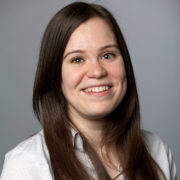















 Jeanine Cook
Jeanine Cook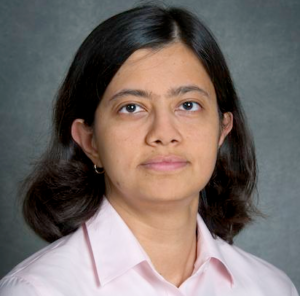 Lavanya Ramakrishnan
Lavanya Ramakrishnan
